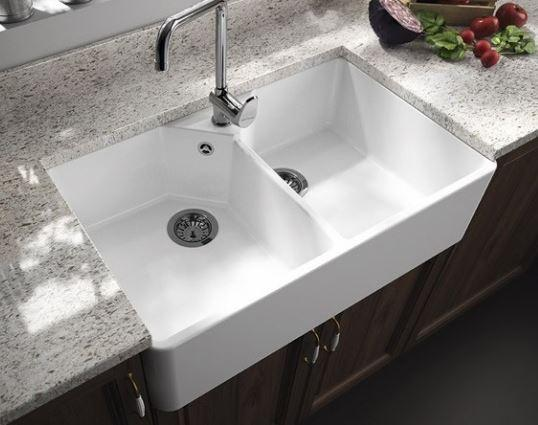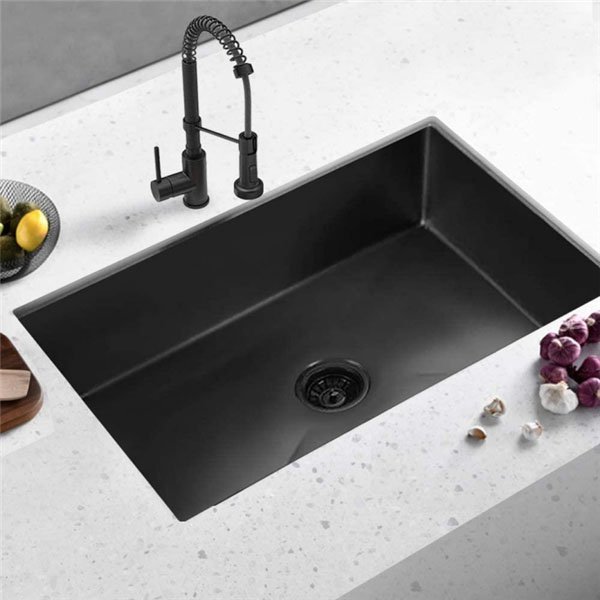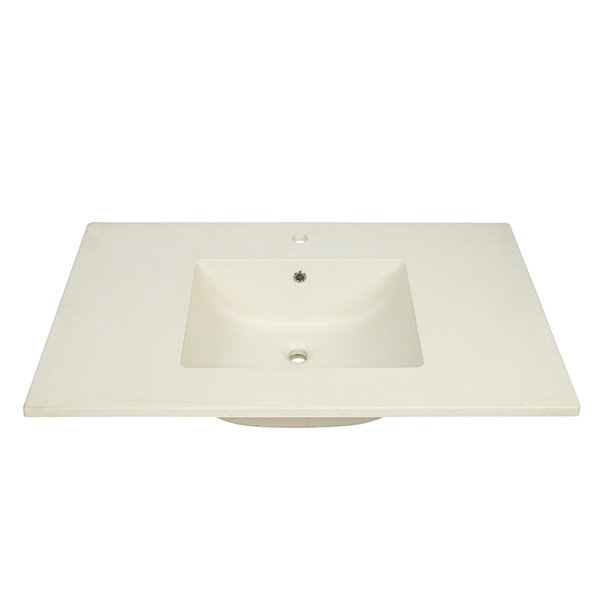Stone sinks came into fashion relatively recently, several decades ago. They are convenient, beautiful, relatively inexpensive, and technologically advanced in installation and operation. At the same time, they hide many shortcomings related to objective and subjective characteristics. How practical is a stone sink for the kitchen, the pros, and cons of which we will discuss below: the reader will decide. In the article, we give only the facts.
What materials are stone sinks made of?
The term “stone” refers to many natural and composite materials, the properties of which in one way or another resemble natural stone. Externally, sinks of different materials can be very different or almost identical; it all depends on the designer’s intention and the manufacturer’s capabilities.
The most common materials for the production of sumps are:
- porcelain stoneware;
- acrylic stone;
- sintering
There are also sinks made of natural marble, granite, and other types of water-resistant natural stone. But they are expensive and relatively rare. First, consider the most popular designs.
Pros and cons of porcelain stoneware sinks for the kitchen
In essence, it is an artificial material made from natural components. It contains particular types of clay, which is used to produce ceramic tiles, silica sand of fine fractions, metal oxides. The resulting semi-liquid mass is pressed after mixing in a certain proportion, thereby forming the desired product, burning at high temperatures – 1200 – 1400 0C.
The result is a resistant product that does not differ in properties from granite. All the charm of porcelain stoneware is that it can be given almost any shape. This opens up wide prospects for designers: from one material, you can make countertops, windowsills, thresholds and insert it into the coating in the form of decoration or aprons.
Porcelain tile has many useful properties. However, not everything is so perfect. There is also a mandatory “fly in the ointment” in a full honey wash. But most of the problems with ceramic granite sinks can be avoided if properly operated.

The advantages of porcelain stoneware kitchen sinks
Durability: useful life of up to 100 years.
Practicality: the surface is difficult to scratch or crack. It is perfectly washable and neutral for most household products, and it does not absorb grease or coloring substances.
Wear resistance: even when cleaned with abrasive brushes and powders, the surface is difficult to damage.
Resistance to mechanical stress: to break a sink, it is necessary to use, at least, a hammer; casual blows are not afraid of it.
Heat resistance: from boiling water, the sink does not crack or deform. No volatile substances or odors are released.
Cons of porcelain tile sinks
Price: compared to other types of sinks, porcelain tiles are significantly more expensive, but if you take into account the service life of 100 years, the price no longer seems so scary.
The possibility of mechanical damage during heavy shock loads: shallow chips and non-through cracks may occur, for example, when metal utensils fall from the height of the top shelf of the cabinet. But the damage is easily repaired with a special, almost imperceptible mass.
It is safe to say: if you have a spacious kitchen furnished with designer furniture and decorated in the same style, you can always find a granite sink in harmony with the situation. This will be one of the best solutions.
Pros and cons of acrylic stone composite kitchen sinks
Acrylic stone composite sinks are made of artificial material consisting of natural and synthetic components. Natural – granite or marble chips, quartz sand, basalt. Synthetic – acrylic resins that act as a binder. It is produced with a mold given a specific thickness and a given configuration. If joints are formed between the walls and the bottom, they will be sealed with the exact composition of acrylic and mineral particles.
In terms of strength, the joints are not inferior to the primary material and do not appear over time. You need not fear leakage at the seams, even after the effects of deformation. But with all the attractiveness of composite sinks, they have more disadvantages than porcelain stoneware.
Advantages of Acrylic Stone Composite Kitchen Sinks
A variety of shapes, components can be mounted in any straight or curved configuration;
Zero toxicity, at any temperature, acrylic and mineral fillers do not emit volatile and liquid, toxic substances. The material is chemically neutral to alkalis, acids, and detergent components;
With high maintenance, we can repair any cracks, scratches, and chips easily with the help of special acrylic pastes, which are inexpensive and very technologically advanced;
Lightweight, the material is much lighter than porcelain stoneware or natural stone, allowing you to install them in pretty light frames.

Cons of acrylic stone composite kitchen sinks
Low resistance to mechanical stress. Damaging the surface is relatively straightforward when struck with a metal object, for example, inadvertently omitting a frying pan. The damage results in scratches or chips;
Low heat resistance, cannot pour boiling water into the sink;
Some types of acrylic absorb dyes, beet or berry juice. For example, it is necessary to rinse immediately. If it is absorbed, then it won’t be easy to wash the sink. But when buying, pay attention to the presence of surface treatment. If there is one, then this negative sign does not appear;
Cost With so many drawbacks, the price of washing is too high.
Buying an acrylic sink is not the worst option. With careful handling, it will last at least 50 years. If you have design furniture in a modern style, choose an unusual acrylic sink will not be difficult.
Pros and cons of agglomerated kitchen sinks
Agglomerated kitchen sinks are made of a material consisting of many mineral chips, much more considerable than acrylic, and a certain amount of polymers that connect them into a single monolithic mass. The primary material used is marble, basalt, quartz, granite, or mixtures thereof. Binders: polymer resins, after hardening, form durable waterproof and chemically inert compounds. Water-resistant pigments, ultraviolet, and chemical reagents color the products. When touched, chipboard sinks are indistinguishable from bowls made of natural stone: the same smoothness and pleasant freshness.
Agglomerated stone sink for the kitchen, the advantages and disadvantages are approximately the same as those of porcelain stoneware in the number of products with great potential. Constantly emerging new types of binders make it possible to improve the performance of the product continuously.

Pros of agglomerated kitchen sinks
High resistance and wear resistance, not inferior to porcelain stoneware;
The lack of the need to polish, damage, or grind the surface will not work even when abrasives are used;
Zero adhesion to grease;
Lack of absorption of coloring substances, drops of juice, wine, coffee does not remain on the walls and bottom and are easily washed off with water;
With various shapes and colors, you can always choose what best suits the interior and ergonomics.
Cons of agglomerated kitchen sinks
The difficulty of restoring the integrity of the sink after damage. But it can be damaged only with great desire and diligence;
Fewer design decisions than acrylic, but other parameters are much better;
Very high cost, more expensive than acrylic, cheaper than porcelain stoneware or natural stone.
Conclusion
When choosing a kitchen sink, it is necessary, first of all, to focus on functionality. Depending on the material, porcelain stoneware is best suited to the classical style, and acrylic to modern and loft, and agglomerated to functional and contemporary techno. To sum up, all types of stone sinks have the right to life and allow you to choose a product to your taste.

